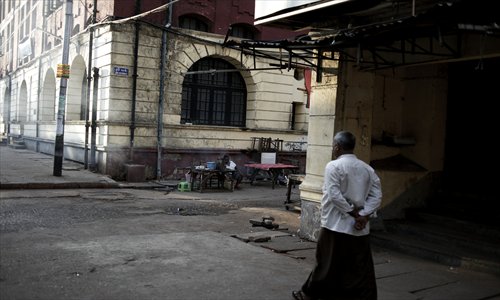HOME >> WORLD
Lopsided development
By Sun Xiaobo Source:Global Times Published: 2013-11-7 0:43:01

Residents on the streets of Yangon, Myanmar. Photo: CFP
Ni Shanshan, who is pursuing her postgraduate degree, managed to take a trip to Myanmar during the National Day holidays from October 2 to 9.
She chose the predominantly Buddhist country that borders China because she is interested in the religion. Another reason is that she wanted to see the dramatic changes that the former junta had undergone since the quasi-civilian government took office in 2011.
During her eight-day visit to Yangon, Bagan and Mandalay, she was surprised to find that the country was not at all as backward as she had learned from reports that mostly focused on Myanmar's sluggish development in infrastructure.
"The country is clean and there are pagodas everywhere. I like it very much," Ni told the Global Times.
For her, the challenges facing Myanmar are not unique but she admitted they remain underdeveloped in some aspects of infrastructure, such as tap water, transport and Internet access.
Tourism boom
Official statistics showed that Myanmar received over 1 million foreign tourists in 2012, compared with around 800,000 the year before. It expects to welcome around 1.5 million tourists this year and 3 million by 2015, according to a report by the country's official media in May.
UN offices were forced out of billionaire Robert Kuok's Traders Hotel in Yangon due to the price hike brought by a tourism boom, Bloomberg reported in July.
However, Ni went to Myanmar during high season but didn't find it hard to book an acceptable room.
"The guesthouse looks pretty clean and similar to that in other Southeast Asian countries I visited," Ni said.
In Myanmar there is no running water available in common households and locals usually dig water out of their yards. In hotels, the water pipes are installed but water comes out yellow and may not be safe to drink or even for laundry. There is bottled water offered in the rooms for the occupants to use.
This did not present a big worry for Ni, neither did the food made and sold by vendors along the road.
She was surprised by the good condition of the "luxury" buses that shuttle between the cities, though those running on the streets within the cities are in a shabby state.
"The seats on the long-distance buses are well equipped, sometimes with only three seats per row. Also, the services are great, providing bottled water, a blanket and even a pillow. They are much better than some buses and flights in China," Ni said.
However, road conditions do not match the vehicles. While roads in the cities are asphalt, those connecting cities are often muddy and bumpy, she said.
"The roads between Yangon and other big cities are being renovated. Bus stations in the three big cities (Yangon, Bagan and Mandalay) are quite basic and one in Yangon looks like a garbage storage area," Susan, a doctor in Zhongshan, South China's Guangdong Province, who visited Myanmar in July, told the Global Times.
"After all, the cities are making development," she said.
Poor Internet access
Sweeping reforms have been witnessed across Myanmar since President U Thein Sein took office in March 2011, propelling Western countries to ease most economic and political sanctions against the country.
However, there are still lots of efforts needed in terms of information and telecommunications.
"ICT (information and communication technology) infrastructure in Myanmar still lacks noticeable improvements. Electricity is an integral part as IT is nothing without electricity. The Internet connection is sluggish and needs to be improved as soon as possible," Nyein Chan Htwe, founder of the One Dollar Fund Myanmar, an NGO devoted to poverty reduction and supporting orphans, told the Global Times via e-mail.
About three-quarters of Myanmar's 60 million population lack access to power supply.
Official statistics show that there were 5.4 million Internet subscribers by December 2012, which means a penetration rate of around 9 percent. Internet coverage is even lower, at around 1 percent.
To deal with the power outages that may happen at any time, hotels are mostly equipped with electricity generators, Susan said.
Travelers always find the state of Internet service troubling.
"In Bagan the free WiFi that I used in several restaurants only enabled me to log into my WeChat account and could not be used to open websites with many words or photos," Susan said.
She was echoed by Chan.
"Although the government is developing the ICT master plan under the framework of economic and social reform, people are still having a hard time checking e-mails," Chan said.
"This should not be the case as two new international telecommunication companies are starting to extend the mobile/Internet penetration rate with reliable services, according to the news," he added.
Two telecommunications operators - Norway's Telenor and Qatar's Ooredoo - won the bidding in June for two new licenses to provide services in Myanmar.
The last frontier
On October 10, Myanmar took the long-coveted role of chairing the Association of Southeast Asian Nations for 2014 and it needs to cope with 1,100 meetings. A more pressing event is to hold the upcoming Southeast Asian Games in December.
There have been doubts whether the country is able to fulfill these tasks but people are generally not as pessimistic as expected.
"There have been remarkable achievements in Myanmar's reform efforts over the past two years. Of course, there are still many problems in its infrastructure but it takes time for any reform endeavor to work out," a Chinese Myanmese surnamed Li told the Global Times.
Challenges come along with opportunities.
"When was the last time a market of 60 million people fell out of the sky?" said Martin Sorrell, CEO of advertising and marketing giant WPP Group, which has invested in media agencies in Myanmar, according to Reuters.
"This is one of the last frontiers."
Posted in: Central & South Asia, Asia in Focus